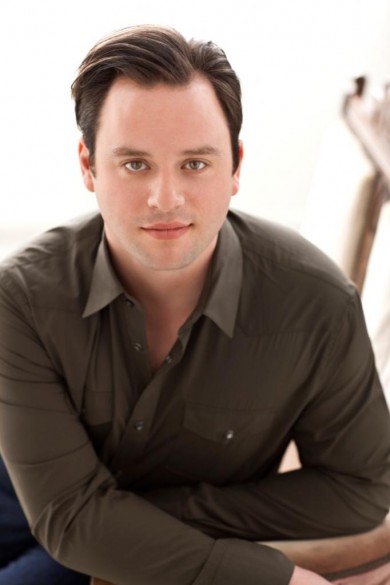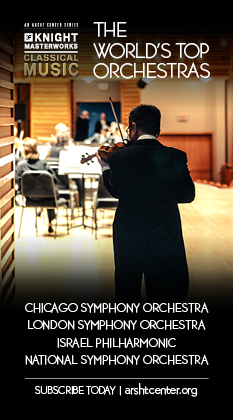Tenor Appleby wraps New World’s chamber series in stirring style

Paul Appleby performed Britten’s “Serenade for Tenor, Horn and Strings” Sunday afternoon with New World Symphony members.
Not many chamber concerts feature a star tenor of the Metropolitan Opera. But on stage for the New World Symphony’s final chamber program of the season was the tenor Paul Appleby, joining the musicians Sunday in Miami Beach for a stirring, atmospheric performance of Britten’s Serenade for Tenor, Horn and Strings.
Composed at the suggestion of England’s great horn player Dennis Brain, the 1943 work sets a series of poems about the night. Taking on the difficult horn part was New World member Josh Cote, doing a superb job in a part that required rapid playing, subtle gradations of tone and booming power.
The solo horn passage that opens the work wasn’t unblemished, requiring, as it did, that the performer not use the instrument’s keys. But it carried a rugged force that served as an effective scene-setter. In “Elegy,” also known as “The Sick Rose,” by William Blake, Cote slowly built up a two-note figure from a quiet, far-off sound to a motif of menacing force.
With his first words, “The day’s grown old,” Appleby sang with a burnished, incisive tone and an emotional intimacy that easily penetrated the sound of strings and horn. Although he generally reined in his volume to match the mid-sized venue of New World Center, he brought Alfred Lord Tennyson’s “Nocturne” to a grand, operatic climax, with intense and thrilling top notes. In “Dirge,” an anonymous 15th-century poem about the hazards faced by the soul on its travels, he opened with a quiet, distant tone and then built to harrowing, hall-filling power as he described the fires of purgatory.
Conducting from the first chair was the guest violinist Roberto González-Monjas. Concertmaster of the Orchestra dell’Accademia Nazionale di Santa Cecilia in Rome, he did a fine job keeping this unusual ensemble in balance.
The concert opened with Beethoven’s “Kakadu” Variations for violin, cello and piano. Aside from a few solemn moments, this piece represents the composer at his lightest, a distinctly Classical-era work from Beethoven’s early years.
It opens with a solemn, minor-key introduction, which the three musicians infused with maximum tension, in a refined, controlled manner. In the theme “Ich bin der Schneider Kakadu” and variations that followed, they played in a breezy but clean style that captured the spirit of the music.
The piece gave each musician the opportunity to shine (or fall flat), and all delivered. Violinist Benjamin Carson displayed fine bow work in one rapid variation, producing crisp, graceful pointed tones. Cellist Hilary Glen showed a gift for long lines of melody in the following variation. Pianist Dean Zhang’s work was strong throughout in his demanding part, delivering a virtuoso performance of broken octaves in one variation and a poetic and pensive series of ornamentations that accompany the violin and cello in another.
After intermission, eight string players took the stage for the Octet for Strings of George Enescu, the great Romanian violinist and composer. The Octet was composed in 1900, and it sounds it, with Straussian harmonies, an ironic, hyper-speed waltz and traces of Mahler and early Schoenberg.
With González-Monjas providing intense top notes on the first violin part, the eight musicians gave a performance of the first movement that was full of nervous energy and lyricism. Technically the performance was impressive, with generally excellent intonation and a glossy surface that allowed Enescu’s youthful feelings to come through.
No one could accuse the musicians of understating the drama of the second movement, which they played with abrupt halts, savage attacks and bursts of manic speed. In the slow movement, González-Monjas played the main theme with mellow warmth, equaled by violas and cellos when they took it up. The last movement, with its odd waltz and busy counterpoint, came off as complex but never chaotic.
Octets, even Mendelssohn’s famous one, aren’t played that much, and it was a pleasure to hear such a committed, technically proficient performance of this rarity.
Posted in Performances
Leave a Comment
Mon Apr 3, 2017
at 1:11 pm
No Comments



